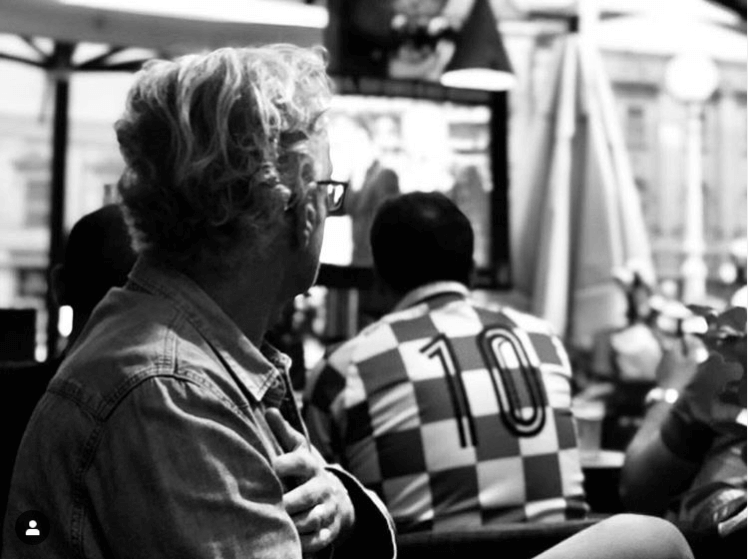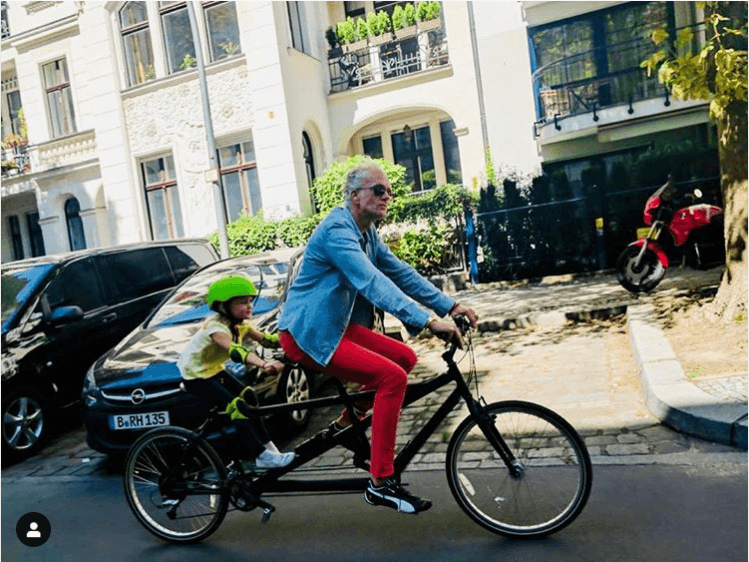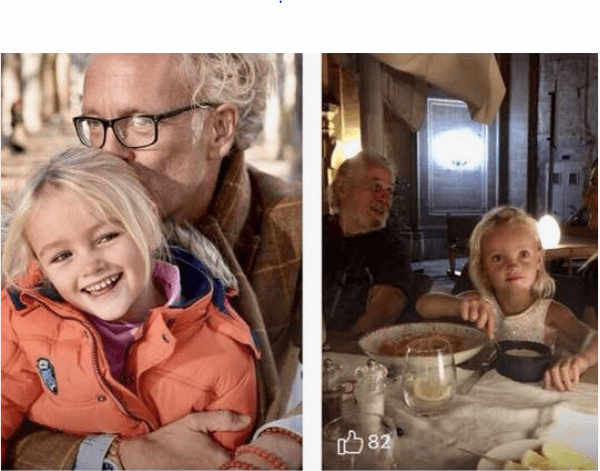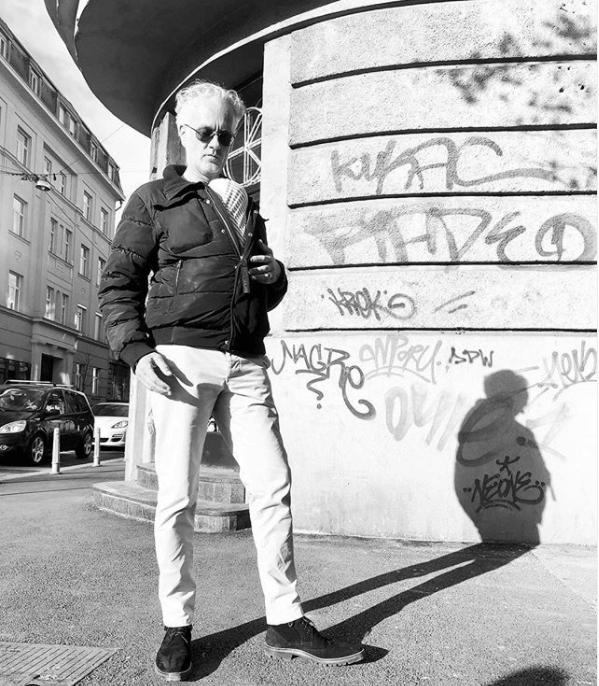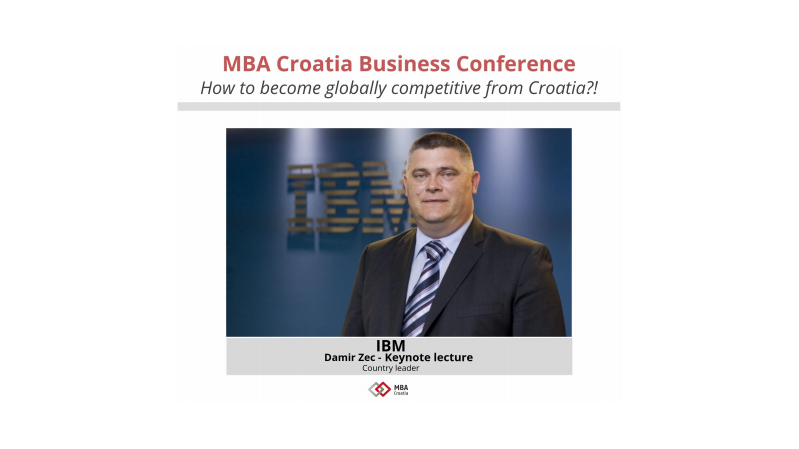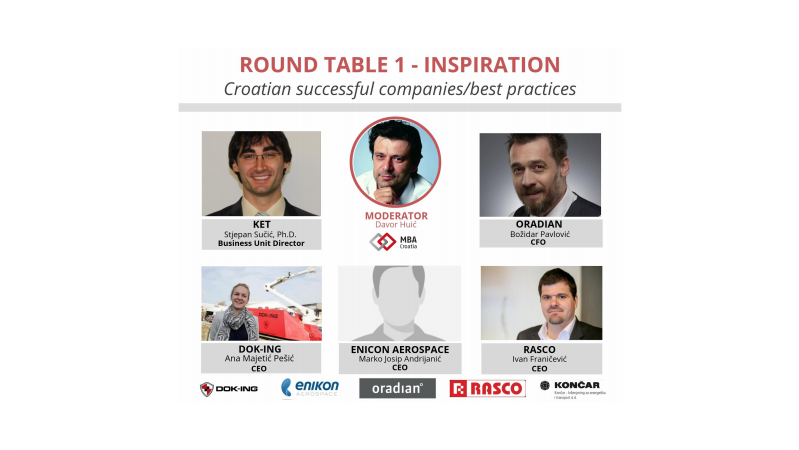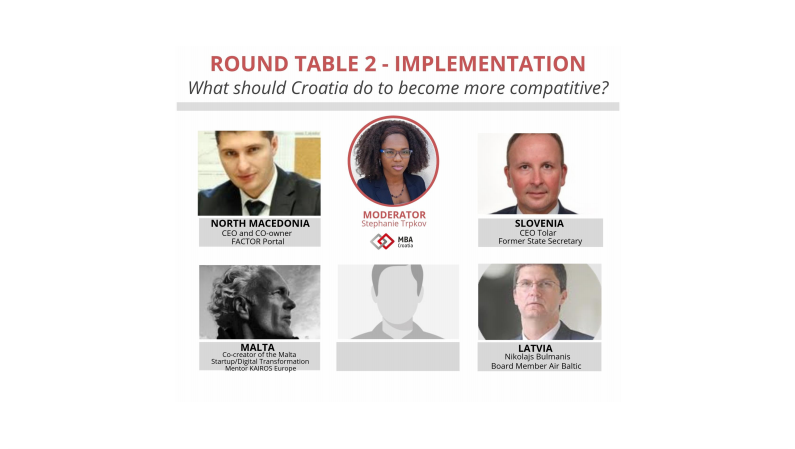MBA Croatia Awards Held in Zagreb to Honor Those that Promote and Live MBA Croatia Values
November 28, 2021 - The 2021 MBA Croatia Awards were held at the Westin Hotel in Zagreb to honor those that most promote and live MBA Croatia values.
Celebrating a successful year, MBA Croatia traditionally presented awards to those we believe most promote and live MBA Croatia values. This year we held our awards ceremony in the Crystal Hall of the Westin Hotel. The awards were presented at the traditional MBA Croatia Gala evening.
As every year, the MBA Croatia Gala dinner had an educational character and two lectures were held. Krešimir Profaca, President of the MBA Croatia Association, gave an introductory lecture where he spoke about the work of the MBA Croatia Association and the role of MBA Croatia in the development of leadership in society. The main lecture was given by Francois Delion, CEO of Renault Nissan Adriatic with a very current topic on how the automotive industry can contribute to reducing CO2 emissions.
MBA Croatia awards were given to Sergio Galošić (CEO of Klimaoprema dd), Dajana Mrčela (President of the Management Board of Saponia d.d.), Damir Sabol (founder of Photomath), Miroslav Vrankić (founder of E-GLAS), and Lada Tedeschi Fiorio (member of the Atlantic Grupa board).
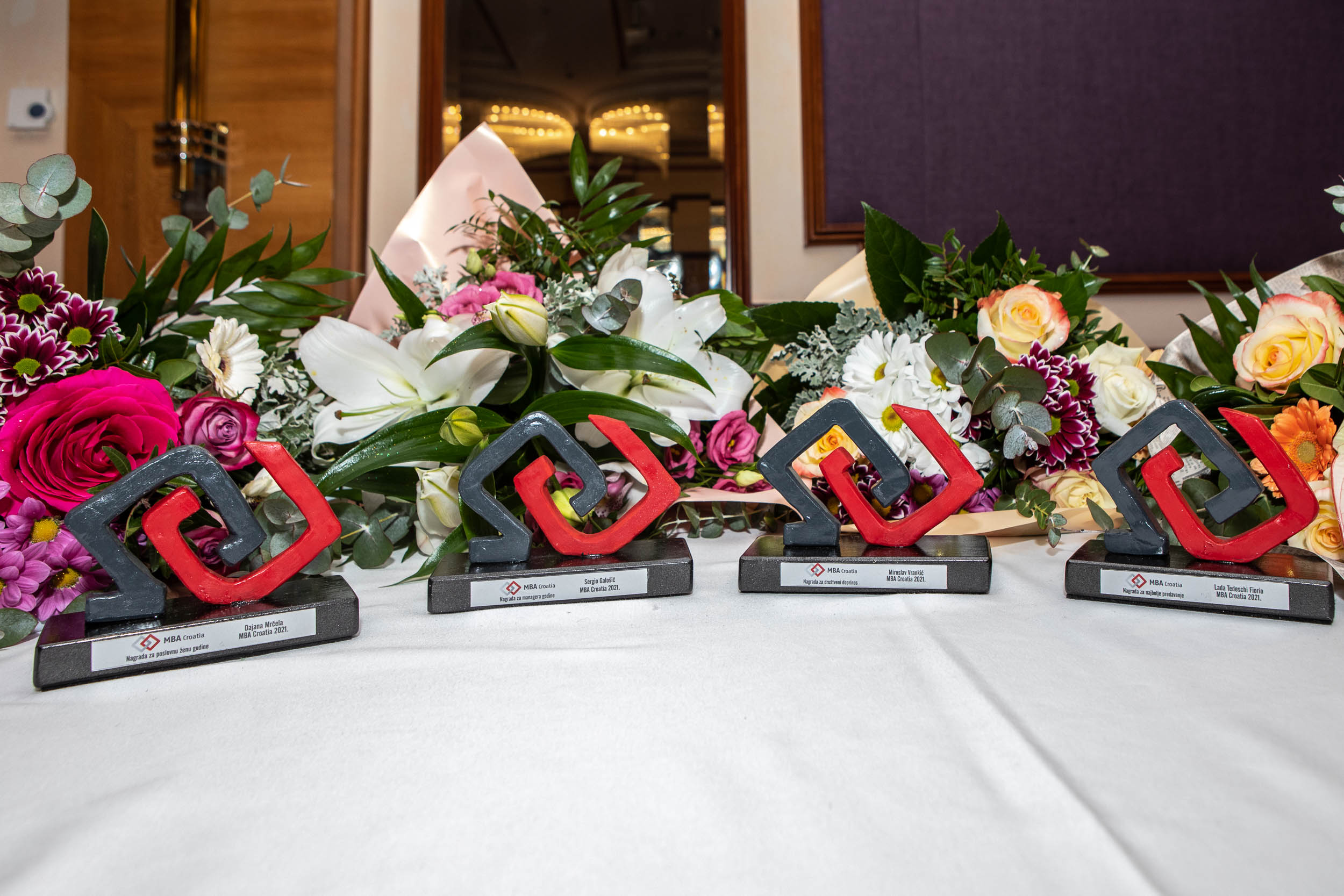
At the MBA Croatia Awards in Zagreb, the MBA Croatia Association traditionally awarded prizes to people whose work and commitment were recognized in 2021.
"Recognitions awarded by the MBA Croatia association are recognitions given by our members. By selecting candidates and awarding prizes, we try to give encouragement to all those who have done something good in the categories for which we award prizes", explained Krešimir Profaca, President of MBA Croatia at the introductory lecture.
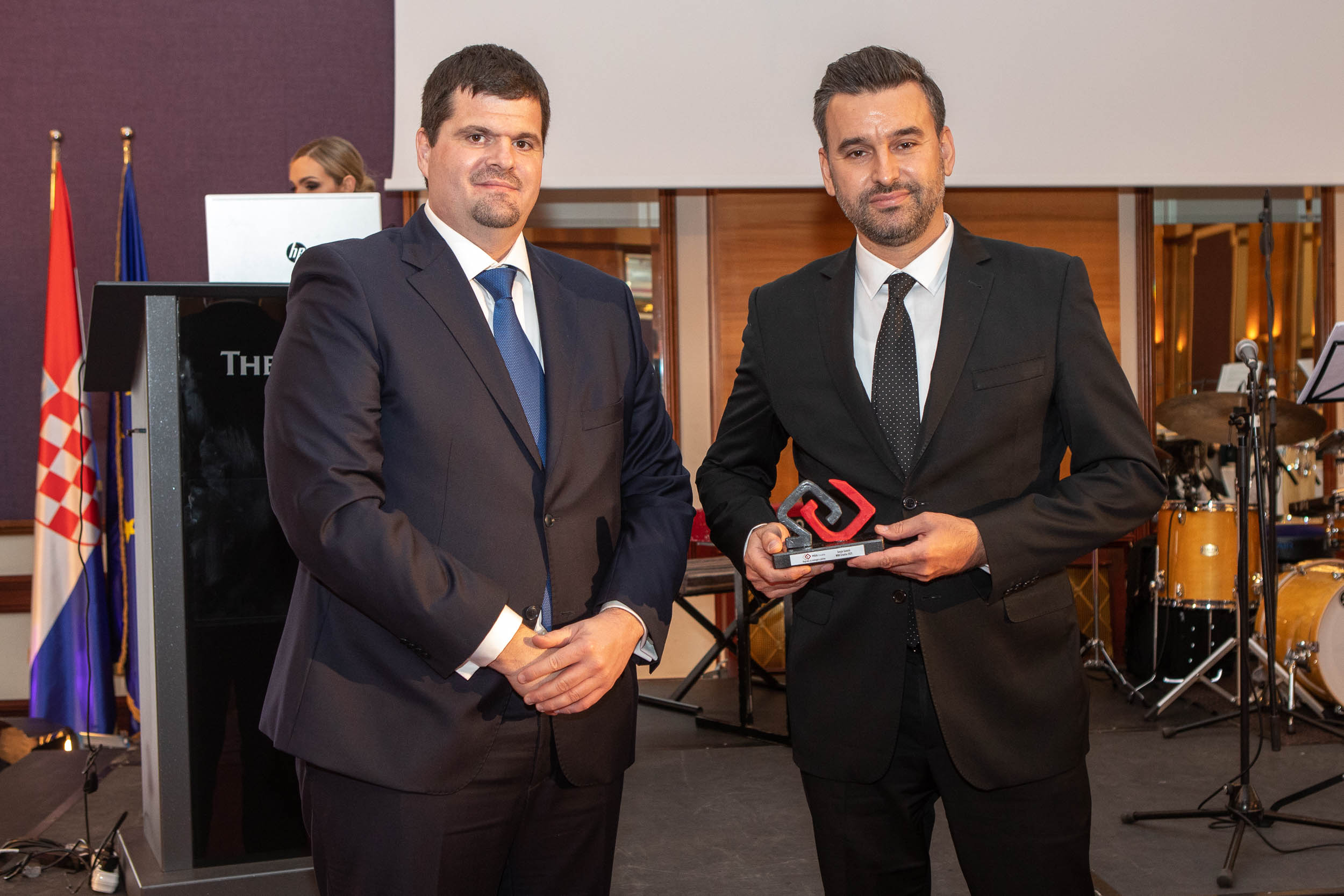
The award in the Category Manager of the Year was given to Sergio Galošić, executive director of Klimaoprema d.d.
''It is a great honor and pleasure for me that my colleagues have chosen me as the winner of the award. What is behind this award is a lot of sacrifice and stress. In this regard, I am especially pleased to receive this award from colleagues who understand what it takes to succeed. I would like to dedicate this award to all employees of Klimaoprema and my team, without whom this would not be possible'' said Sergio Galošić. The award was presented on behalf of the association by Ivan Franičević, a member of the presidency of MBA Croatia.
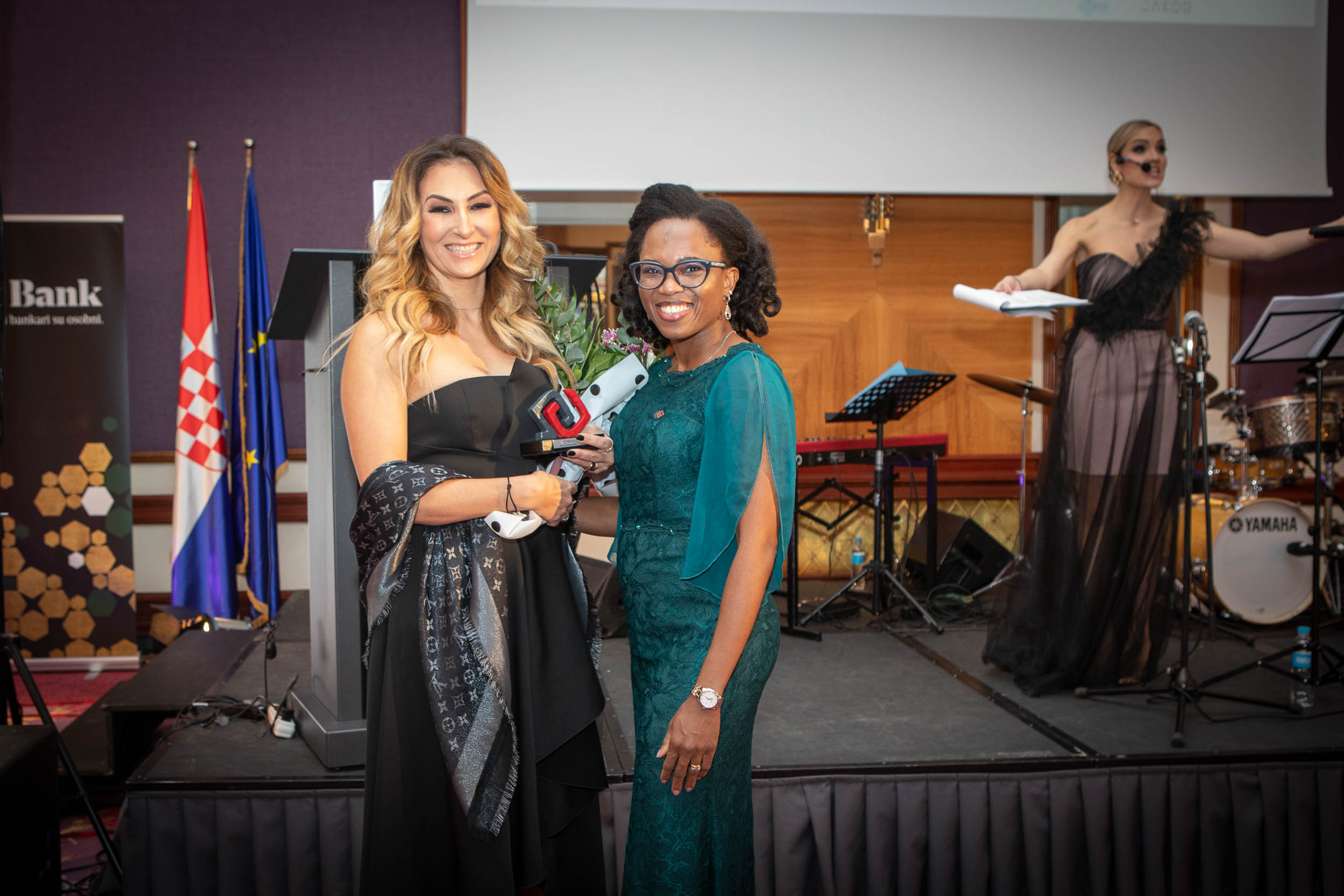
The Business Woman of the Year award was given to Ms. Dajani Mrčela, CEO of Saponia d.d.
"I am extremely honored to be the winner of this award. When I received the notification, I felt great pride that the profession recognized me and my work. This is a special honor for me and I would like to thank MBA Croatia, my team, and everyone else" said Dajana Mrčela.
Promoting diversity, along with excellence, ethics, and responsibility is one of the main values of the MBA Croatia association. The association brings together business people with an MBA degree and other leaders who promote the values of the association. Its mission is to inspire in creating a better and more advanced society. The award for Business Woman of the Year was presented on behalf of the association by Stephanie Trpkov, a member of the presidency of the MBA Croatia association.
Damir Sabol, the founder of Photomath, received an award for connecting science and business. MBA Croatia awarded this award to Mr. Sabol for his continuous work on promoting science in business.
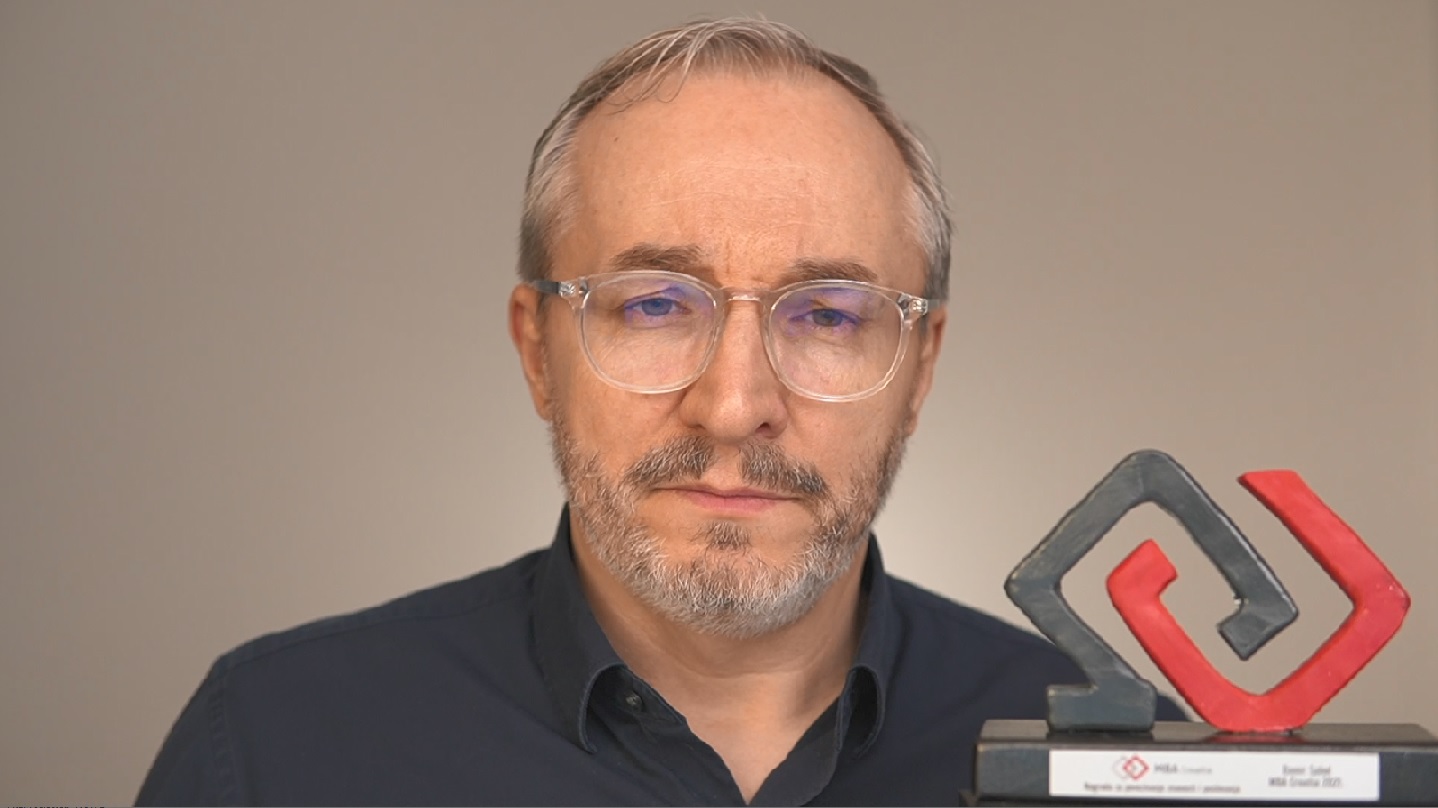
"I am especially glad to receive this award from the group of leaders gathered by the MBA Croatia association. At this time, we have the opportunity to participate in the world market with our knowledge and work, and we should make the most of it'' said Damir Sabol.
The MBA Croatia award for social contribution through business in 2021 goes to Miroslav Vrankić, the founder of the company E-GLAS, which is making life easier for people with disabilities.
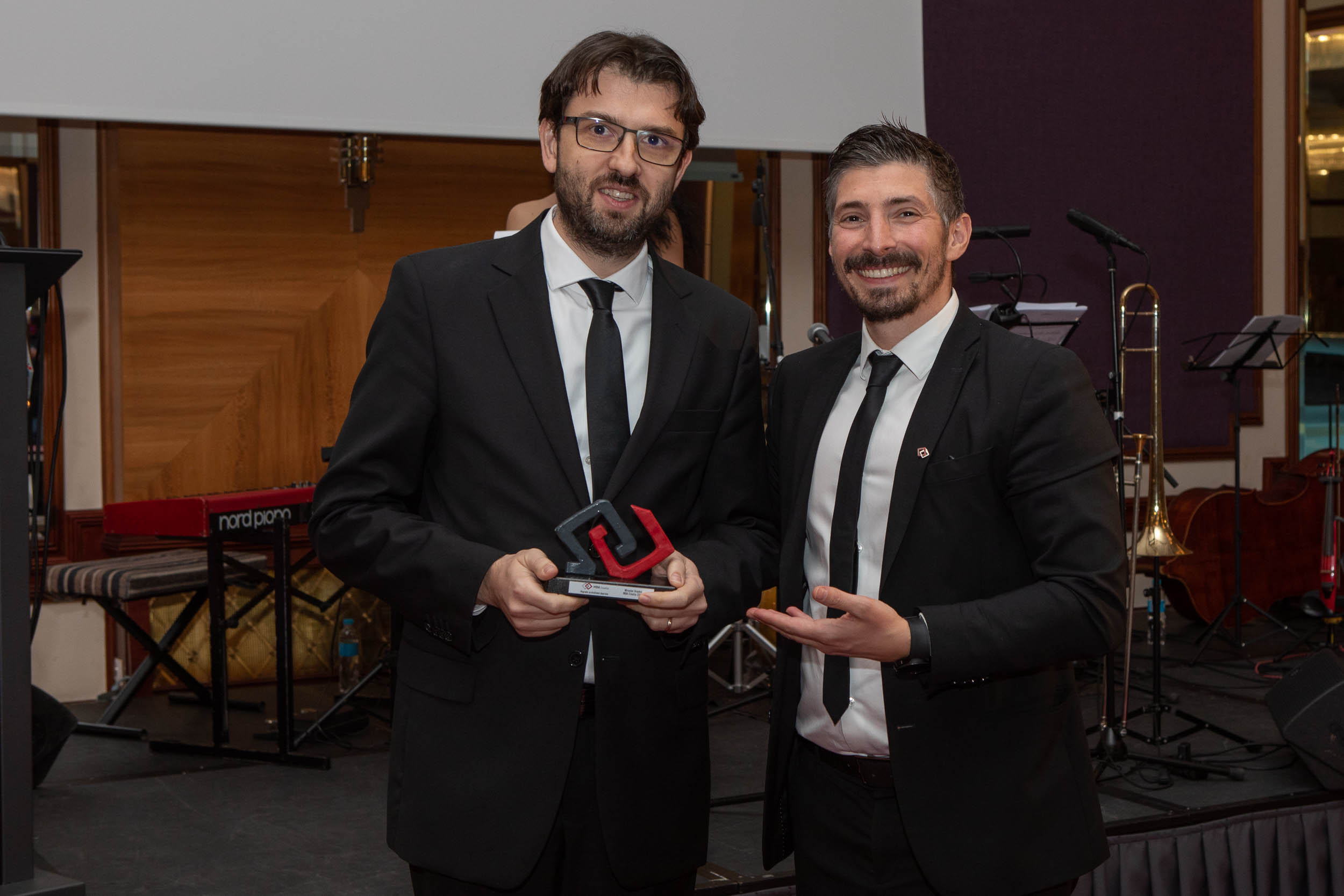
''It is a great honor to receive this award. E-VOICE has been around for 20 years and helps children with speech difficulties. This award is a confirmation that we are doing a good job and an incentive to continue even better" said Miroslav Vrankic. This award was presented to Mr. Vrankić by Ognjen Bagatin, Deputy President of MBA Croatia.
One of the most important activities of the MBA Croatia association is the transfer and dissemination of knowledge, and we do this through our lectures, workshops and other educational and networking events. That is why the award for the best lecture is extremely important and we are proud that the members of MBA Croatia have chosen a member of the management board of Atlantic Grupa, Mrs. Lada Tedeschi Fiorio as the winner of this award.
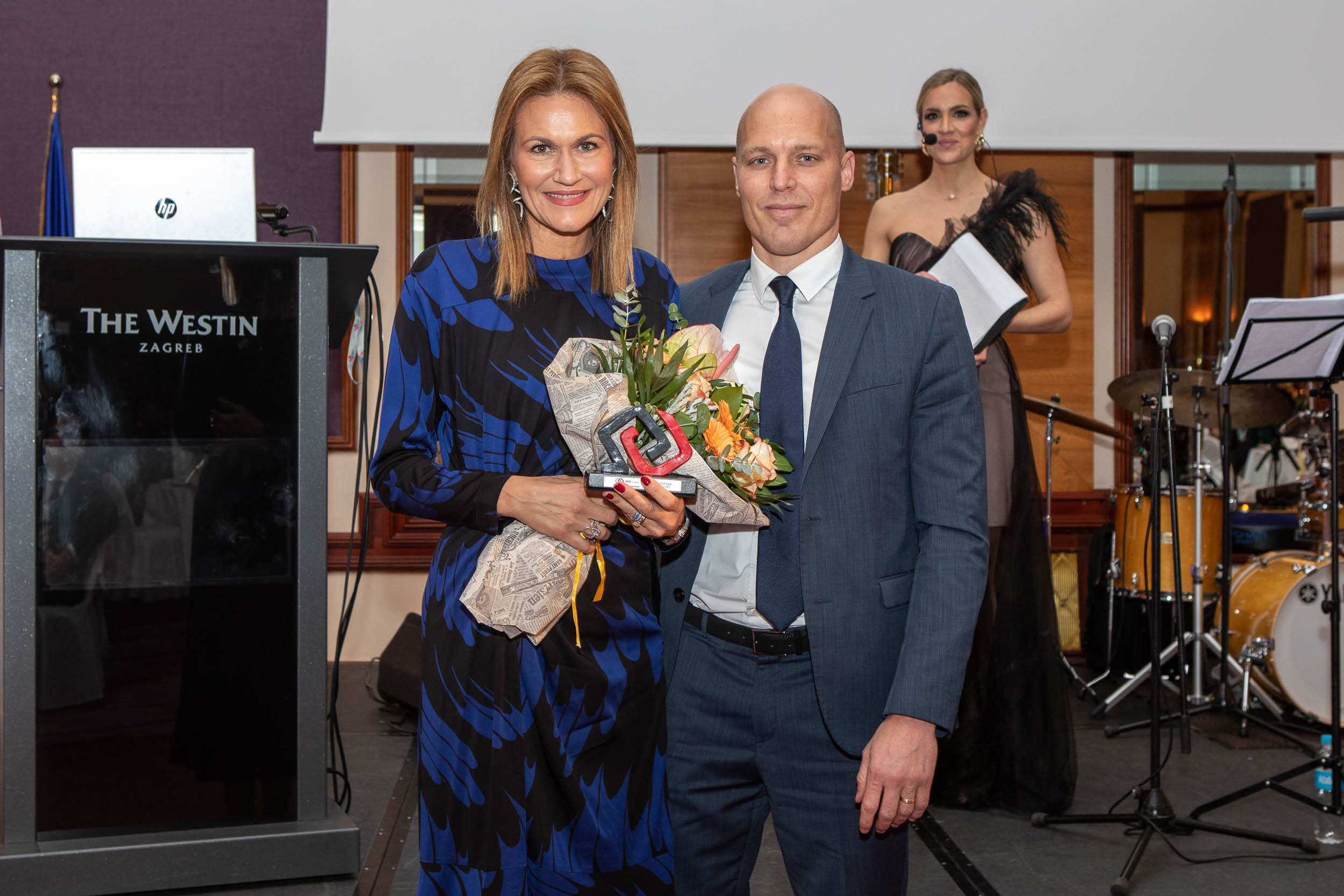
''I don't know how to thank everyone. I am especially glad that the award came from people who value knowledge, who want to progress, and who are interested in further development. Maybe it's because I've shown what it's like to be a manager and to be a leader, I've been able to reach people so much" said Lada Tedeschi Fiorio.
The award for the best lecture was presented by a member of the presidency of the MBA Croatia association, Marko Ćosić.
MBA Croatia awarded the winners with unique awards, statues that represent the logo of the association.
For more, make sure to check out our dedicated lifestyle section.
Stephanie E. Trpkov: Searching for Excellence in MBA Croatia Association
March 12, 2021 – In presenting its members, Croatia's first and only organization of MBA professionals – MBA Croatia Association – impersonates Stephanie E. Trpkov. As an entrepreneur and World Bank consultant, she explained why knowledge is the key to everything and why she always seeks excellence.
Stephanie E. Trpkov is an entrepreneur, director of Intech Ventures d.o.o. and a longtime consultant at the World Bank in competitiveness and energy. Besides, she is an expert advisor at the Executive Agency for Small and Medium-sized Enterprises (EASME) to develop innovation projects.
With a career focused on low-carbon transition, digital transformation, and smart cities, the European Commission selected her as a leading expert for two of the four Croatian cities within the "100 Intelligent Cities Challenge" initiative (Rijeka, Velika Gorica, Osijek, and Split), namely for Velika Gorica and Split. She completed biochemical engineering and the Executive MBA program at the Cotrugli Business School, and Poduzetnik magazine interviewed her on that topic.
How did you decide to enroll in MBA studies?
As my profession is in biochemistry, although I ran an engineering company in Nigeria and lived in America and England, I always lacked knowledge in finance and economics. When I came to Croatia and started working in a consulting company, I was assigned foreign clients, and I started working with senior management. That "hole in knowledge" would always appear there.
As I was responsible for Southeast Europe, I did not understand the mentality and way of doing business in that area, so I decided to enroll in an MBA. Although the first choice was LSE (London Business School), I decided to enroll in a regional MBA, and back then, Cotrugli Business School was the best choice. In short, I enrolled in the MBA because of the desire for knowledge in finance and economics and getting to know the culture in the business of Southeast Europe.
The most important value that an MBA study has?
The importance and significance of integrating different perspectives in the project. On the MBA, we were all different and yet similar, but again all with different views. It is very important to know how to integrate this and respect the other side's vision.
Knowledge or networking – which is more important?
Knowledge is the key to everything. Networking is often seen as a tool for meeting people for personal gain, which is wrong. If you have no knowledge, you will not know how to network either. Networking means connecting with people so that you can bring them something valuable and preferably benefit from joint activities. Networking is a skill that must be learned. If a person has no knowledge, he will not be able to network, and everyone will run away from him. The key component of MBA studies is knowledge – knowledge about oneself and society, and networking is a consequence.
Why is it good to be a member of an association like MBA Croatia?
Even as a child, I learned that if it makes sense to do something, I have to do it great. That is my life motto! Being in search of excellence is something that drives me to this day. The projects I do can't just be good; it's not enough for me. They have to be great! That is why I am in the MBA Croatia Association – because of the constant search for excellence that the association and its members promote.
About MBA Croatia Association
Once a month, the MBA Croatia Association organizes interesting lectures by top lecturers from Croatia and the world on various topics. So far, they have hosted representatives of almost all industries and participants in all social events. From scientific lecturers (such as astronomer and educator Korado Korlević) to lecturers who participated in the organization of the world's largest projects (Boris Sakač on IT at the Olympic Games), directors of the largest and most successful Croatian companies or foreign diplomats and ambassadors in Croatia.
At the beginning of all programs, the first business lecture was given by Dr. sc. Saša Petar. After that, various topics were presented in the lessons: from comparing economic plans of political parties to intellectual property in music, which Miroslav Škoro and Nikša Bratoš discussed.
Over time, the interest of members to share their knowledge with a small group of people increased. Hence, several times a year, the association organizes the MBA workshop, an internal seminar only for members. There are many benefits that only members of MBA Croatia enjoy, including a free subscription to certain magazines.
To read more about business in Croatia, follow TCN's dedicated page.
Celebrating Croatian Global Excellence and Opportunity at 1st MBA Croatia Conference
June 7, 2019 - MBA Croatia held its first conference in Zagreb yesterday, How to Be Globally Competitive from Croatia. It was a stimulating exchange of information and ideas.
There was no Mate Rimac, the champion of innovation and of a Croatian businessman who can not only compete on the world stage, but also lead the way.
There was no Nenad Bakic, the successful entrepreneur who, along with Rimac, featured in The Financial Times list of top 100 digital champions of 2018.
But there was still an abundance of world-class Croatian entrepreneurship on show at the first MBA Croatia conference in Zagreb yesterday, a stimulating afternoon of two panels discussing how businesses can be globally competitive from Croatia, as well as a keynote speech from Damir Zec, country leader of IBM in Croatia.
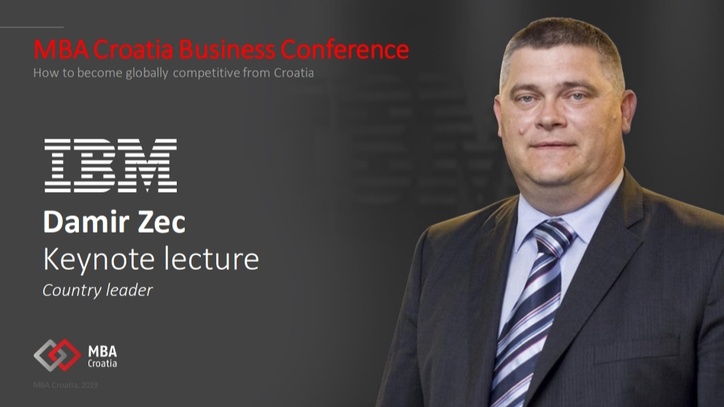
While there may have been no Rimac, the entrepreneurial spirit of Rimac was very much in attendance, most notably through MBA Croatia President, Aco Momcilovic, who introduced the conference and its speakers. Momcilovic, who spent three years running the HR department at Rimac Automobili, has worked hard with his colleagues to provide a platform of entrepreneurial excellence and networking with MBA graduates and students in Croatia.
The conference also made a little bit of Croatian history, the organisers think, in that it was the first Croatian conference in history to be live-streamed in English on the Internet. As a statement of intent for Croatian businesses aiming for the global economy, it was a laudable move, although Secretary of State Mario Antonic seemed to have an issue with a Croatian conference being in English due to '4-5 people who do not speak Croatian.' There were in fact 16, but if the message of the conference, as well as the potential of Croatian business, is to extend beyond the country's borders, so too must the business mindset. I was already feeling comfortable in a very progressive organisation.
On a personal note, I was very honoured to be invited to the conference. Since moving from Hvar to Varazdin, I have been spending a lot more time in Zagreb, and it is has been a fascinating experience to learn more of the MANY Croatian businesses in many fields, which are not only doing well in the region, but also on the global stage. For every Rimac who rightly makes the headlines, there are a growing number of Croatian companies who are following.
And the first panel was proof of that, and I learned about more Croatian excellent that is number one in the world, albeit in a less stylish sector that the slick Rimac electric supercars. These are the Croatian businesses which made up the first panel:
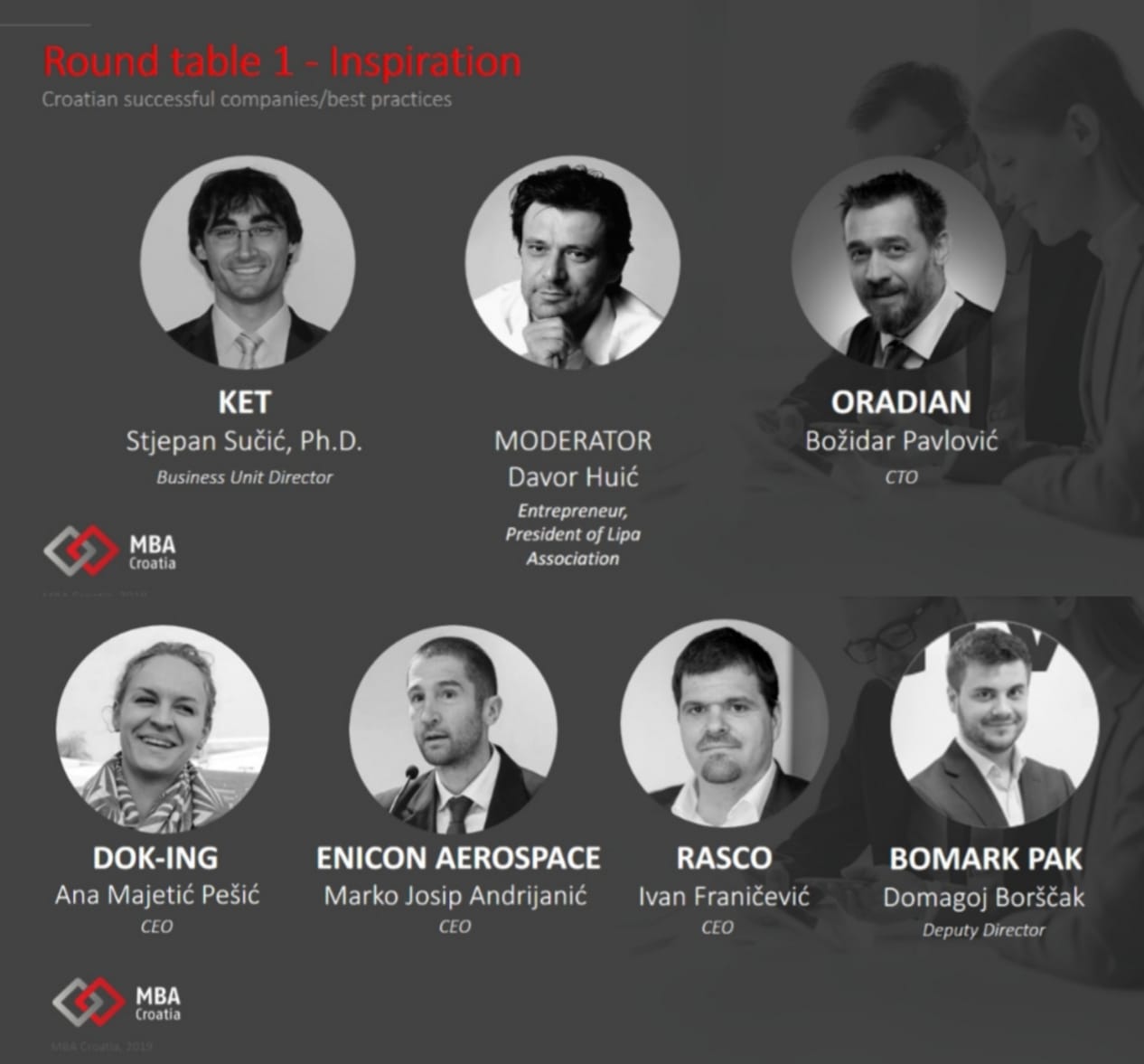
Ana Majetic Pesic - Dok-Ing - "DOK-ING is a 100% privately owned Croatian company, established in the late 1991 and registered for the production of robotized and special purposes systems and equipment." They are global leaders in demining vehicles and technology, with the US Army among their many international clients.
Marko Josip Andrijanic - Enikon Aerospace - "Enikon Aerospace is the leading company in the world in the finishing and painting of interior parts for commercial aircraft." A company I had never heard of, the world leaders in their industry, employing 600 people worldwide, with offices in Zagreb, the USA and two in Germany.
Bozidar Pavlovic - Oradian - "Oradian was founded in 2012 by financial inclusion practitioners and fintech experts who spent years observing cooperatives, microfinance institutions (MFIs), microfinance banks (MFBs), rural banks and Saccos struggle to grow with the rigid technology available. Since 2012, Oradian has earned international awards and recognition for leading financial inclusion in frontier markets and building the fintech platform that the industry needs." Based in Zagreb and with offices in Nigeria and the Philippines, here was another global leading company, and one which was attracting top software developers to move TO Croatia, as everyone was seemingly leaving. There are some 24 nationalities of Oradian based in Zagreb.
Ivan FranicevicIvan Franicevic - RASCO - "RASCO is the regional leader in specialised industrial vehicles and is present in over 30 markets in Europe, Central and North Asia and North America."
Stjepan Sucic - KET - "KONČAR - Power Plant and Electric Traction Engineering Inc. (KONČAR - KET by short) is the main contracting and engineering company within the KONČAR - Electrical Industries Inc. (KONČAR Group)." The company which built some of the biggest dams in the world, as well as many other things, has reinvented itself with a software development sector, which is providing innovative software solutions for dam maintenance.
Domagoj Borscak - "Bomark Packaging Ltd. is a member of Bomark Group, a company that has grown from small family distribution company into a manufacturer and distributor that operates throughout Europe. the only stretch film producer in Croatia."
Outstanding Croatian companies which had found their niche in the global market and made it their own. What was heartening was to see a broad range of sectors represented in this cross-section, from IT to manufacturing.
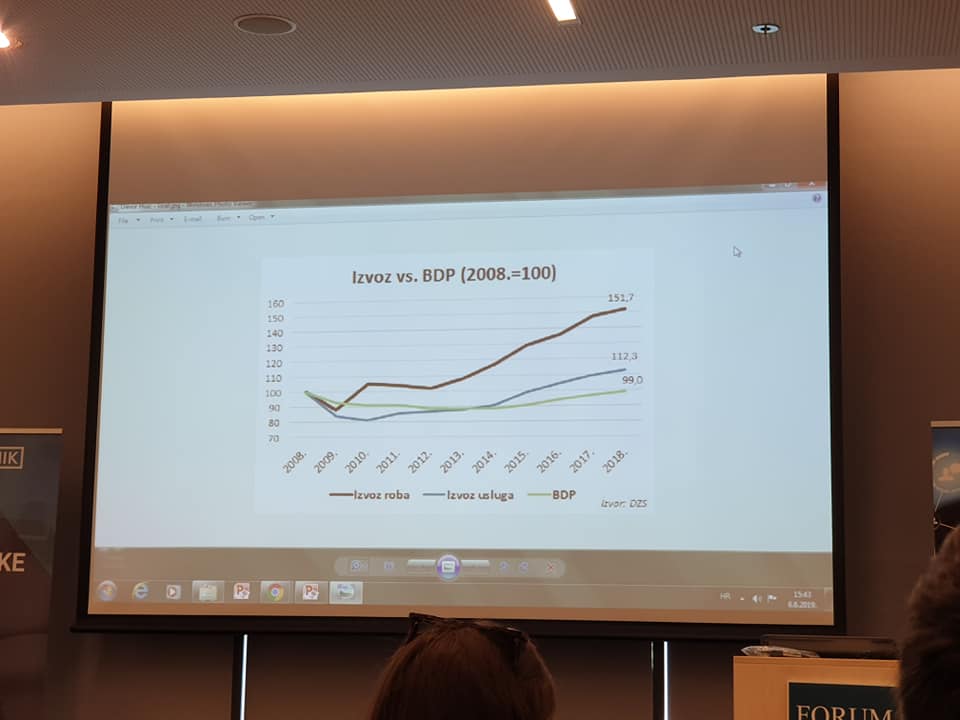
One of the more surprising revelations of the panel was this slide, which shows the difference between GDP and Croatian exports over the last decade. While GDP has remained relatively constant, there has been a 50% increase in Croatian exports. There was discussion on how much of that was due to innovation and technology as opposed to much lower wage costs in Croatia. You can watch both Damir Zec's keynote speech and this inspirational panel in the video link below.
The second panel - Implementation - had a very international feel with a lot of global expertise and knowledge. Moderator Stephanie Trpkov from the World Bank knows Croatia well and said that she had visited more than 120 companies to see how they could become more globally competitive.
Latvia is a small nation which is making great strides, and it was represented by Nikolajs Bulmanis, Board Member of Air Baltic. So too is North Macedonia, and Aleksandr Manev had good insights into attracting international startups and approaches to taxation. One of the most progressive IT countries in the world is Israel, and Israeli Ambassador to Zagreb, His Excellency Ilan Mor, was generous in sharing his knowledge of how Israel has become a market leader in the digital age. Necessity is the mother of invention, especially when you have no cross-border trade with your neighbours. And from Malta, via his native Germany, serial entrepreneur Andreas Wil Gerdes shared his vision of how the economy in Croatia could be turned around in 6 months, based on his Maltese experience.
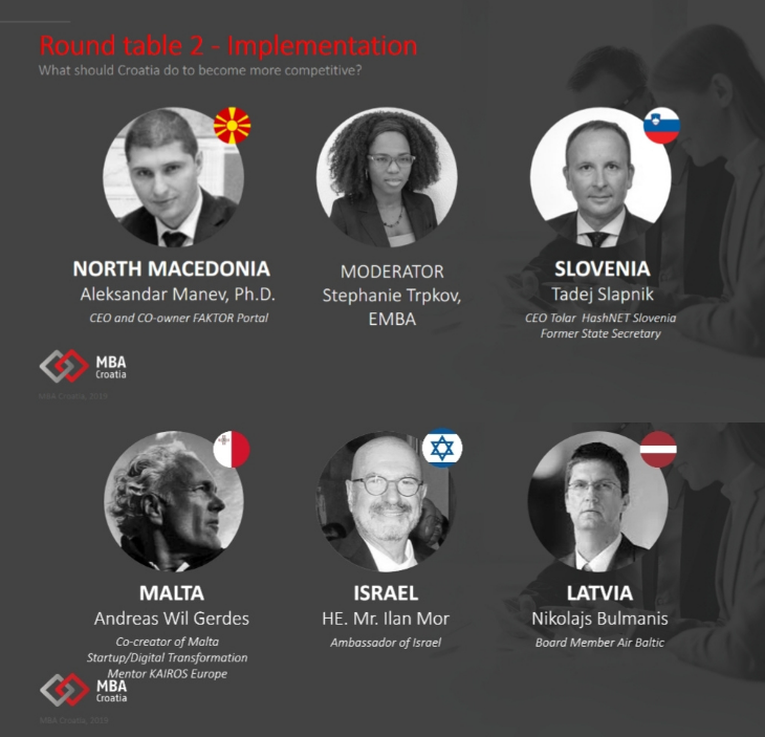
In an age where a 16-year-old striking pupil in Sweden is realigning the whole climate crisis debate, Gerdes' vision of Croatia's future was refreshing, logical and easy to implement. But this is Croatia...
"This is one of the most amazing countries I have experienced in my life. This is one of the oddest countries as well, which I don't get. It has one of the highest suicide rates in Europe. It has one of the best fibre optic infrastructures, it has an amazing climate and really interesting people. Plus we have nearly 20 million tourists coming each year.
"So what do you do? Use the fibre optics. Connect to the 20 million. Add a few to that. And follow the example of Malta and others. Forget trying to produce things. Invite people to come here. Croatia is one of the least densely populated countries in Europe, and there are plenty of empty houses."
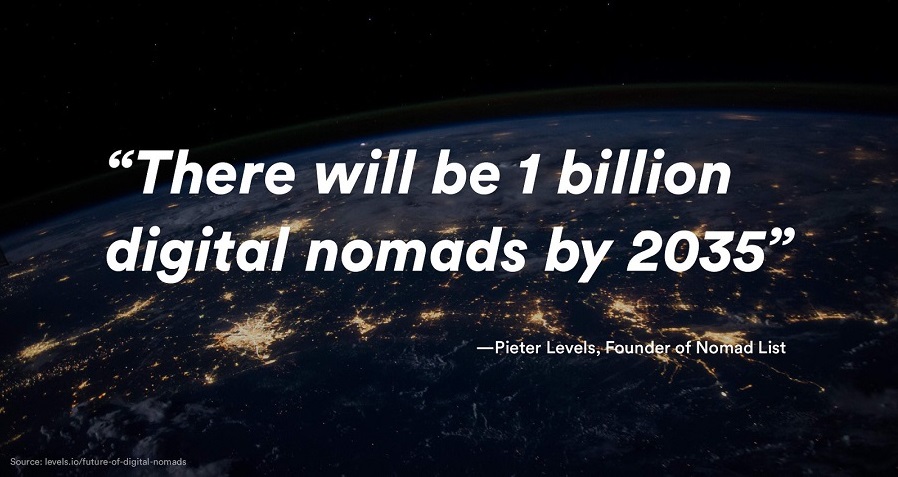
It is an intriguing thought. Just as a 16-year-old in Sweden can change the debate, so too one billion digital nomads could potentially redirect the entire global economy.
And - let's daydream a little - imagine that Croatia with all its natural advantages to cater to this growing industry - location, nature, climate, connectivity, lifestyle, English spoken, the list goes on - and could attract a fraction of this wealth-creating and tax-contributing sector of the economy, how would the future look then?
What started out, for this correspondent at least, as a conference on Croatian companies become competitive on the global stage has changed a little into how to attract internationals to Croatia who have been proven to be successful on the global stage. And encourage them to continue to be globally competitive from Croatia.
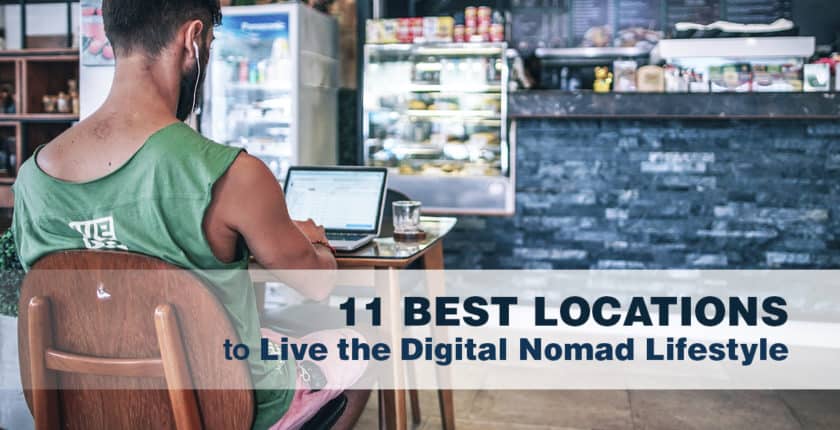
You can check out the entire second panel below.
To learn more about MBA Croatia, visit the official website.
Andreas Wil Gerdes: Entrepreneurial Change for Croatia 2.0
June 2, 2019 - Does Croatia have a bright future with so many young people emigrating and the economy in trouble? Serial entrepreneur Andreas Wil Gerdes thinks so, and TCN caught up with him ahead of his participation in this week's MBA Croatia conference, How to Be Globally Competitive from Croatia.
One of the things I have learned over the years living in Croatia is that any foreigner talking positively about the future of Croatia is often met with ridicule. Foreigners don't understand how Croatia really works, the realities below its very photogenic, tourist-friendly exterior, and any sign of positivity from a foreigner is a sign of how little they truly understand about the country.
It is a mindset I have some sympathy with after my 17 years and continuing education about the realities of Croatia. I now understand Croatia a lot more than I did even four years ago, and yet I too continue to have hope for the country's future. I do truly believe that technology will eventually conquer Uhljebistan, and that the rising entrepreneurial class, investment power of the diaspora and increasing foreign investment in a more transparent Croatia will bring lasting and positive change.
But change must come.
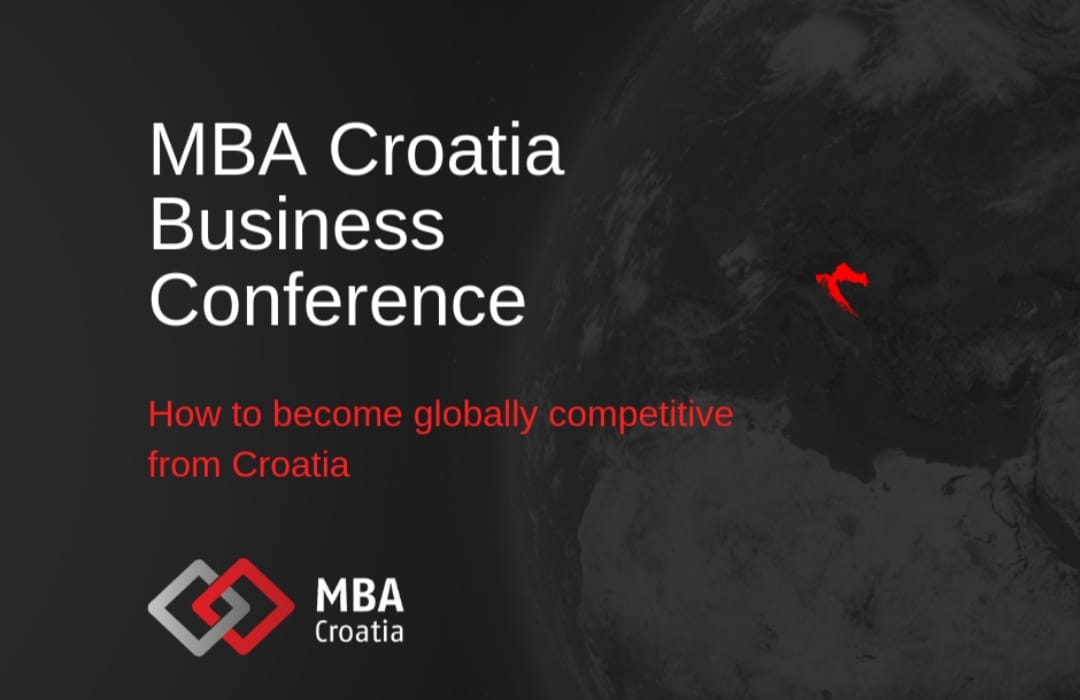
One of the things I have enjoyed most about moving from gorgeous Hvar to equally gorgeous Varazdin has been the proximity to Zagreb, its next-generation entrepreneurs and stimulating foreign businessmen who see opportunities in this country. After years of writing just about tourism, this new angle of Croatia has been refreshing indeed.
The Croatian entrepreneurs, in particular, have been a pleasure to spend time with. They are from the culture of the modern Croatia, are familiar with the negativity and disadvantages, and yet still they try and want to succeed.
I interviewed successful entrepreneur Andrija Colak last year (whose Surf'n'Fries franchise is now on 5 continents) about doing business in Croatia and will never forget one sentence.
"If you really want to test your concept and it survives in Croatia, you can conquer the world! hahah! Actually, I'm not joking."
The subject of how to be globally competitive from Croatia is the theme of next week's MBA Croatia conference in Zagreb, an event which has attracted an impressive list of international entrepreneurial speakers. Among them is a German entrepreneur, whom I met recently, and whose positivity is both infectious and motivating. He also very much believes in the future of Croatia based on his experience elsewhere and believes that the positive change is not too difficult to obtain, or even that far away.
"Meet Andreas Wil Gerdes, Entrepreneur, (World Citizen #8) and a passionate father. Andreas sold his first business at the age of 20. Working out of a garage, he then successfully built what would become part of Orange PLC. Andreas has been at the forefront of the mobile telecoms revolution empowering lives for over 25 years." (from the 2017 Malta Innovation Summit).
1. You have been taking a greater interest in Croatia in recent months. Tell us how you would assess the business climate. What are the opportunities and constraints?
Croatia is blessed with its people, climate, nature, and location.
The current attitude seems ideal to preserve the status quo. To boost positive change an ‘update’ is essential. The current attitude reminds me of East Germany.
2. A lot of Croatia's youth is leaving in search of better economic opportunity. What needs to happen to reverse that, and how optimistic are you that this exodus can be reversed?
A booming Croatia, embracing international people/ businesses/ projects, and digitalization opportunities.
This will stop what you call ‘exodus’, attract great talent to Croatia, and empower the youth, and future generations.
3. You are here to speak at a conference on making companies globally competitive from Croatia. What advice do you have for companies here looking to succeed on the international stage?
Focus on people with an international attitude and a commitment to keep learning. Implement mobile working solutions which allow most of your team to work anytime, anywhere. Consider Croatia as your test-market, for scalable and multinational business models.
4. There is a lot of pessimism about the current situation and the future, and yet you are very positive about things changing here, talking about Croatia 2.0. Why such positivity when you are surrounded by so much negativity - what are you seeing that others are not?
Positivity is a daily choice, boosting health and happiness✨
I actually keep receiving - all I do is to transmit what comes up in my head and my heart.
5. You enjoyed considerable success bringing change to your adopted homeland of Malta. Tell us a little about that and what, if anything, could be applicable to Croatia today?
Headware/ attitude changes triggered change, enabling Malta1.0 and all that followed. Malta became a booming place, by embracing international people/ businesses/ projects and digitalization opportunities.
6. What will be the main drivers of positive change in Croatia in your opinion?
People, people, and people✨
7. Where do you see Croatia in 10 years from now?
If it makes the right choices, I can see Croatia very much prospering ten years from now, but it will not take that long for the effects to be felt. It needs to embrace international people, businesses and projects and take advantage of digitalization opportunities.
Digital Nomads will be the core to boost prosperity. The digital nomad culture and the wealth it is generating is increasing rapidly. Croatia has many natural advantages to become a major digital nomad destination.
When I first arrived in Croatia, on 1 October 2017, together with my daughter Maya (4 at the time), it felt like ‘home’ to us. There is a connection which goes back more than one lifetime. We love coming back, and spending time in Croatia, e.g. Zagreb feels like the most Mediterranean German town, combining great German features with a Mediterranean lifestyle.
For more information about the MBA Croatia conference, click here
You can connect with Andreas Wil Gerdes via LinkedIN and Instagram.
How to Become Globally Competitive from Croatia: MBA Aco Momcilovic Interview
May 29, 2019 - Croatia may not be the easiest place in Europe to do business, but there is a budding entrepreneurial class which enjoying considerable success and getting more organised. Ahead of the first MBA Croatia business conference in Zagreb next week, TCN caught up with MBA Croatia President Aco Momcilovic.
His CV includes three years as the Chief Human Resources Officer of Rimac Automobili, and so MBA Croatia President Aco Momcilovic knows a thing or two about how to become globally competitive starting from Croatia, the subject of the first MBA Croatia business conference, which will take place on June 6 at the Forum Zagreb Congress Centre.
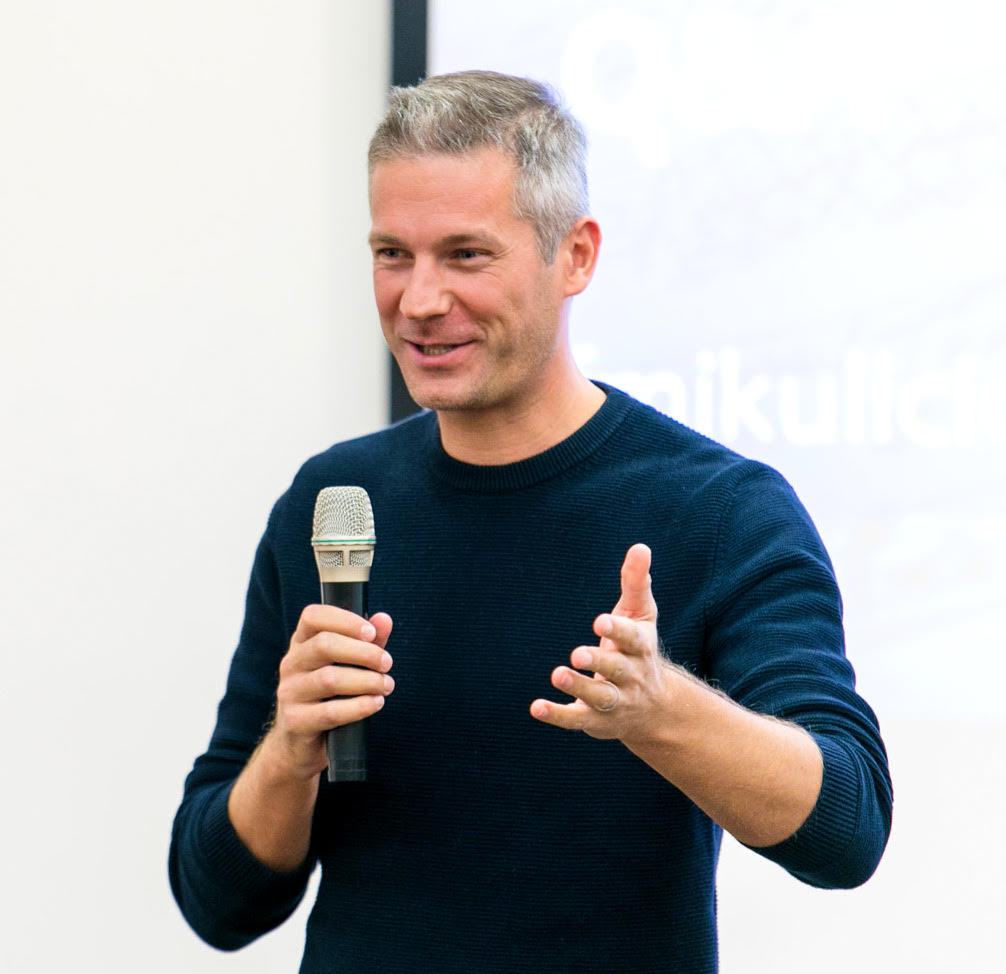
1. MBA Croatia sounds like an excellent initiative. Can you briefly introduce it? What are you trying to achieve and what have you achieved so far?
MBA Croatia is the biggest long-term business association in the country with regular monthly events and other yearly gatherings. It is a great opportunity to network and exchange knowledge. We gather all MBA alumni, MBA students, and business people interested in our activities and who share our values, mission and vision. We want our members and guests to have lifelong education as a habit, and to enable them to continuously enlarge their network of professionals. Our vision is to create and gather alumni of world level leaders, and our mission to inspire the creation of a better and more advanced society. In the 10 years of our existence, we have organized more than 100 lectures and other events and had a few thousand people participating in them.
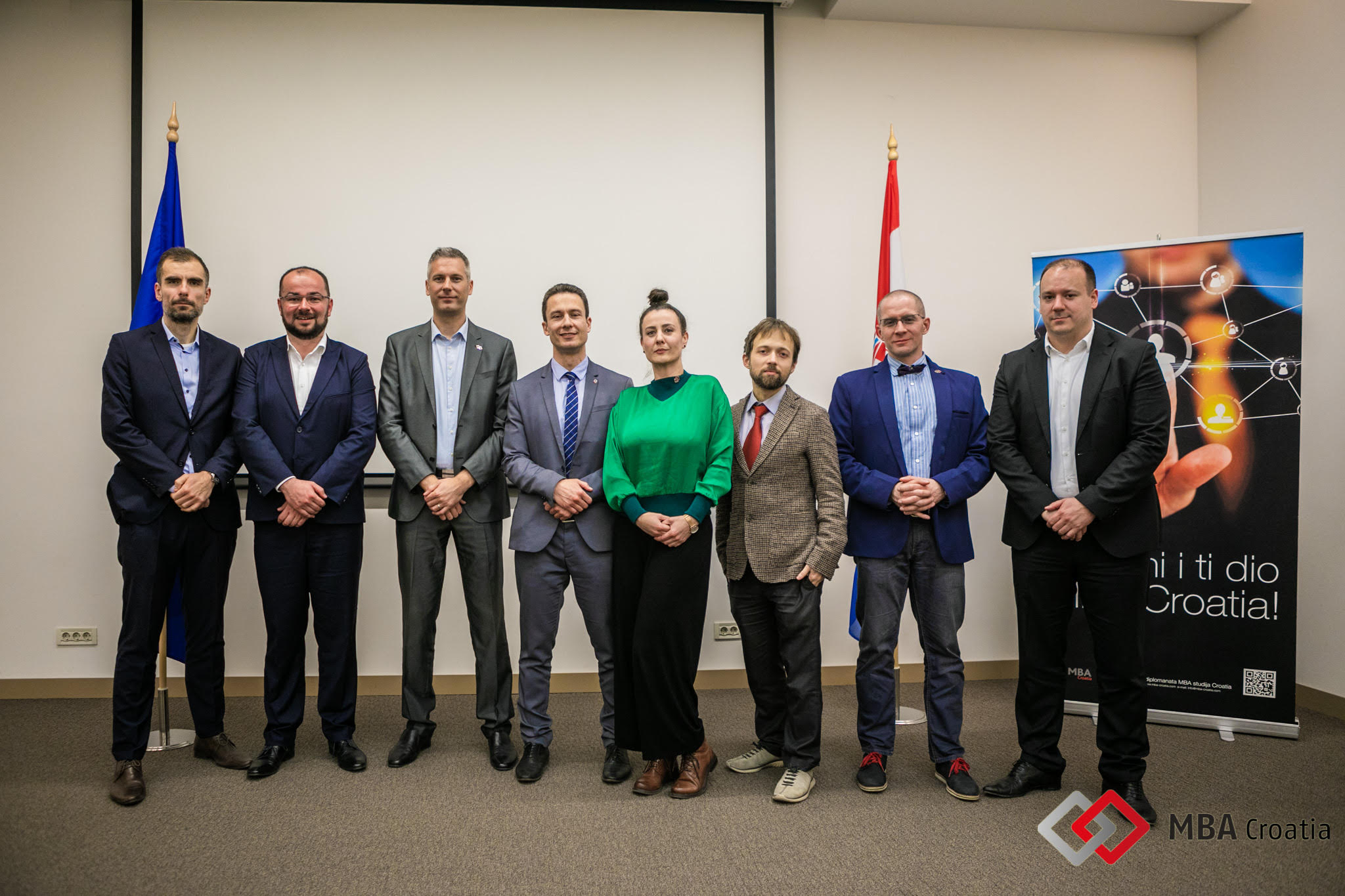
2. Your upcoming conference is called How to Become Globally Competitive from Croatia. You have personal experience of this, having worked at Rimac Automobili. Tell us about that experience, and what lessons can be learned for other Croatian businesses?
As we can see in many Croatian companies, there are lots of great people, great ideas, and a lot of potential to compete on the world level and be the best in some segments. One very important thing is the mindset of the owners and entrepreneurs. Their ambition and confidence to deliver in the most challenging environment. In that area for the country, it will not be enough to have only Rimac Automobili and a few other companies. We should create a system that will continuously produce a higher number of companies of that quality. A good example of that success is Israel which branded itself as a startup nation. We can and must learn from the successes of Israel, Estonia, and other similar countries.
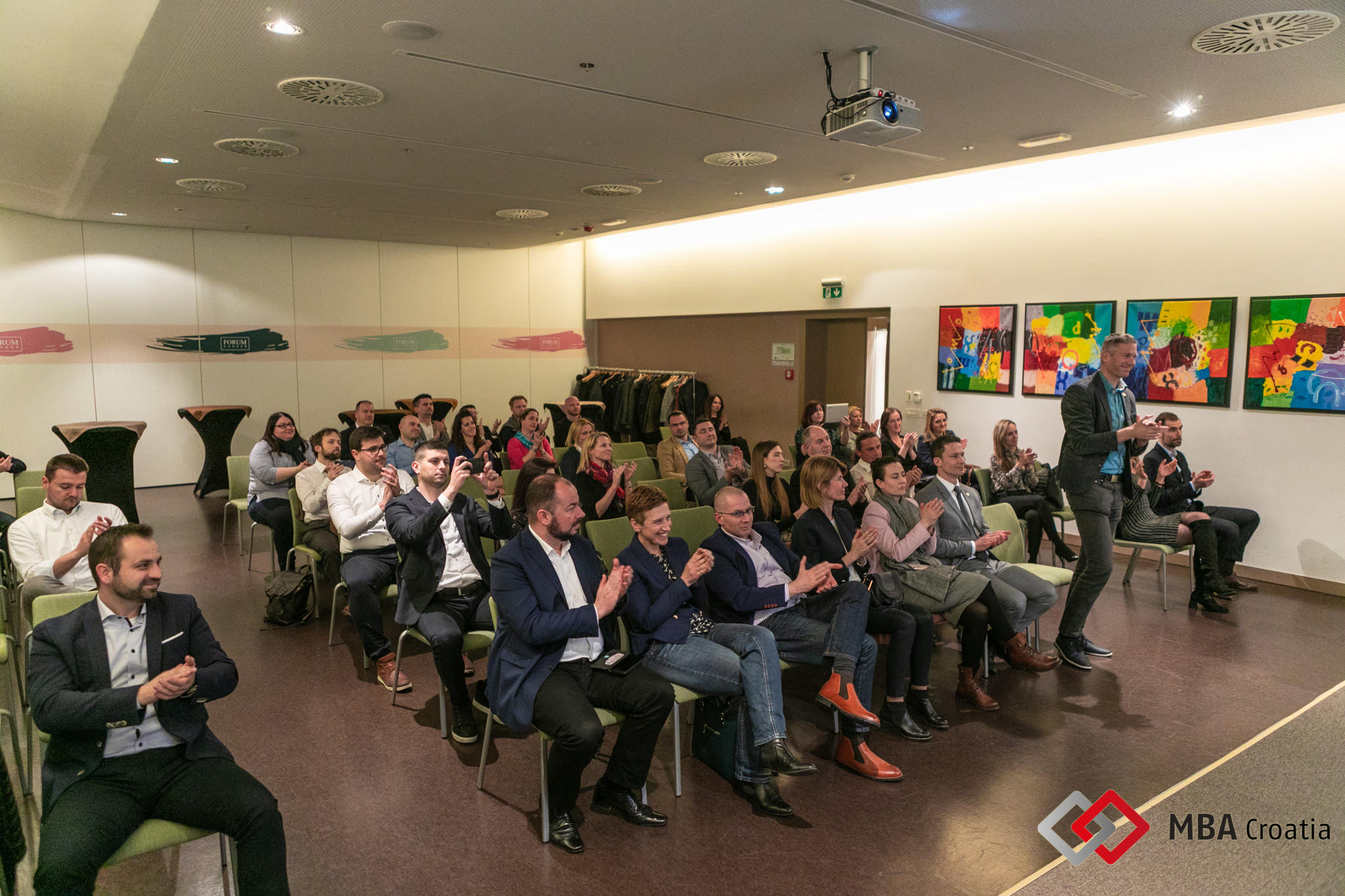
3. A lot of Croatia's talented youth is emigrating in search of better economic opportunity. You personally are still here. Has emigration occurred to you personally, and why have you decided to stay?
Because I am still very connected to the country, and all the fantastic people still living in it. It is true, and it saddens me to see that many of my friends left, but we in MBA Croatia and some connected projects (like Meeting G2) are trying to reverse the trends, and maybe in the mid-term attract those people to return back.
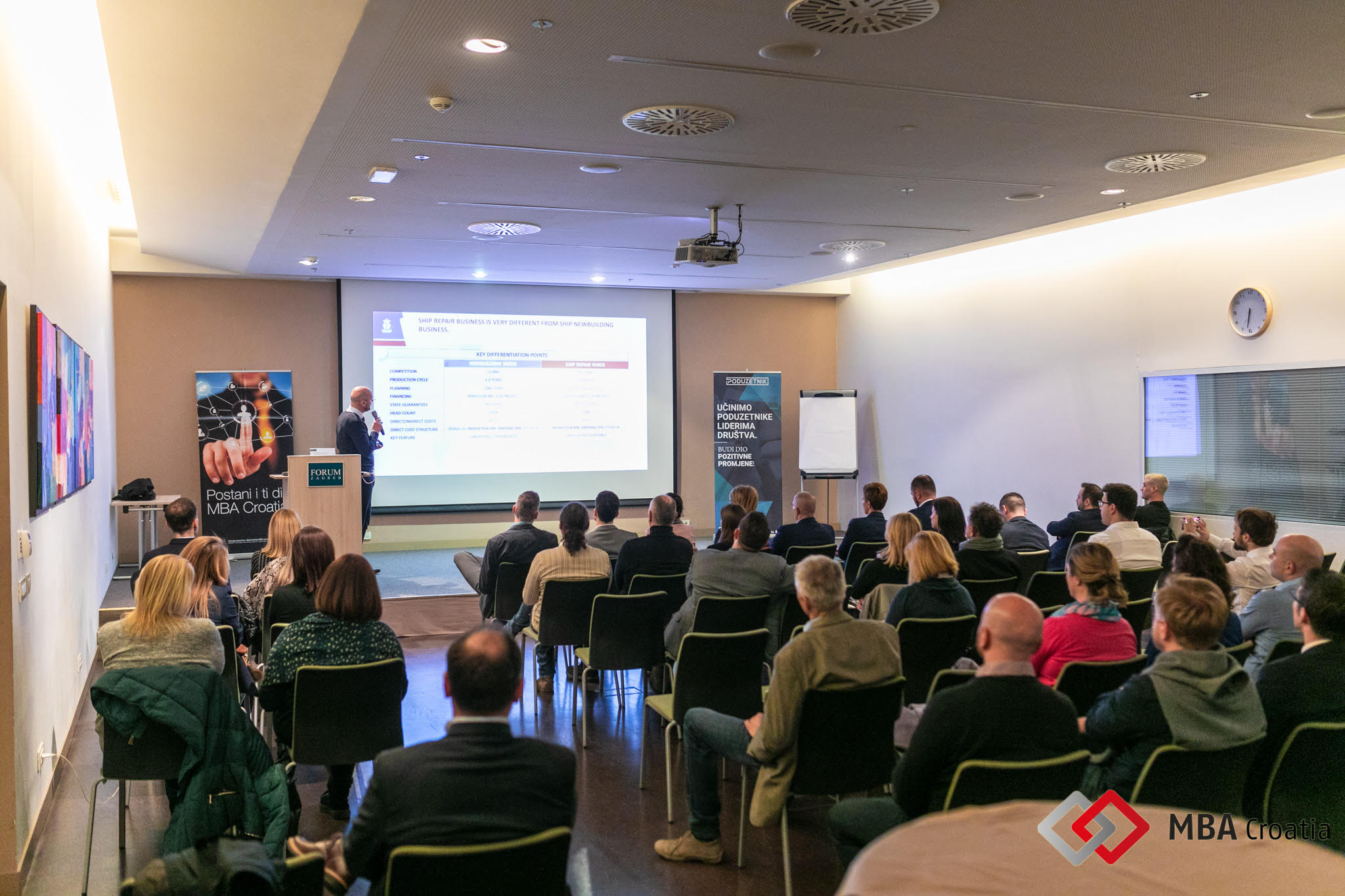
4. Give us an overview of the business climate in Croatia, and the opportunities for entrepreneurs. Do you see signs of improvement?
Many pages of text are written on that topic by economists who are specialized in that area. More or less we all agree that the situation is far from perfect and that it should be improved on many levels. Although it is our goal to influence those decisions, this conference is also aimed at individuals and owners and CEOs of companies who need encouragement, and experience of those who already walked the path of internalization of their business. Currently, some improvements are happening, but much slower than they should. This is also the time to raise that question to the public.
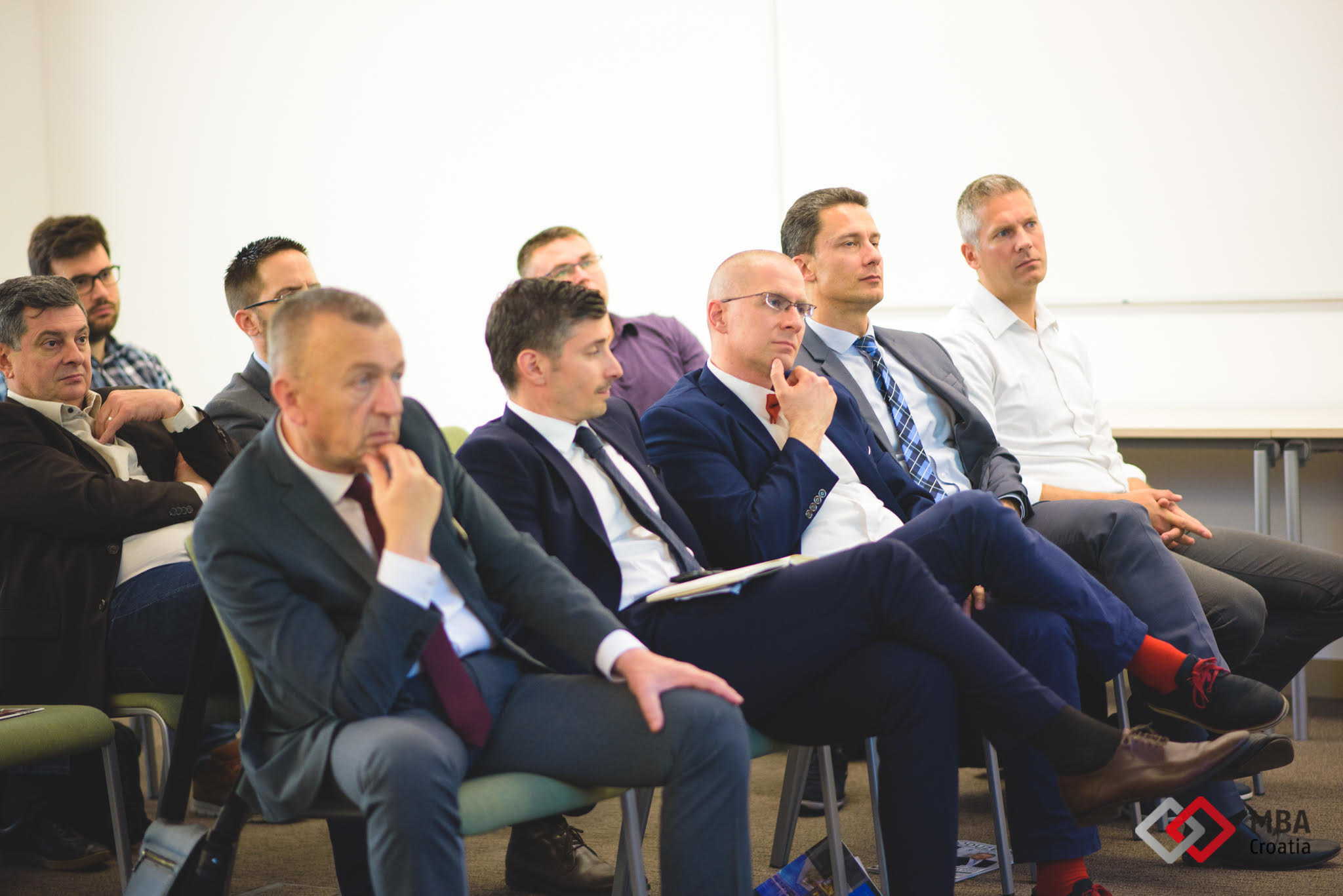
5. Three things you would change about doing business in Croatia if you were in a position to do so?
Create the system that is transparent, and as a result, minimize corruption. Secure easier foreign investments, and of course less administrative and other obstacles for doing business for everybody.
6. The conference has a rich field of international speakers. Tell us a little about them.
Andreas W. Gerdes is a very successful entrepreneur and I would say visionary of the future, from Malta. Always with new ideas, and new energy to boost changes and improvement.
Tadej Slapnik, former State Secretary of Slovenia, also in the management of Tolar, an international project in the blockchain, who can share many interesting experiences from his career.
Nikolajs Bulmanis, Board Member of Air Baltic, a top-level executive from one great company that has been through the change management process.
We also expect representatives from Macedonia and Israel to learn even more international best practices.
The moderator will be Stephanie Trpkov, employed in the World Bank and with experience directly in the field of competitiveness.
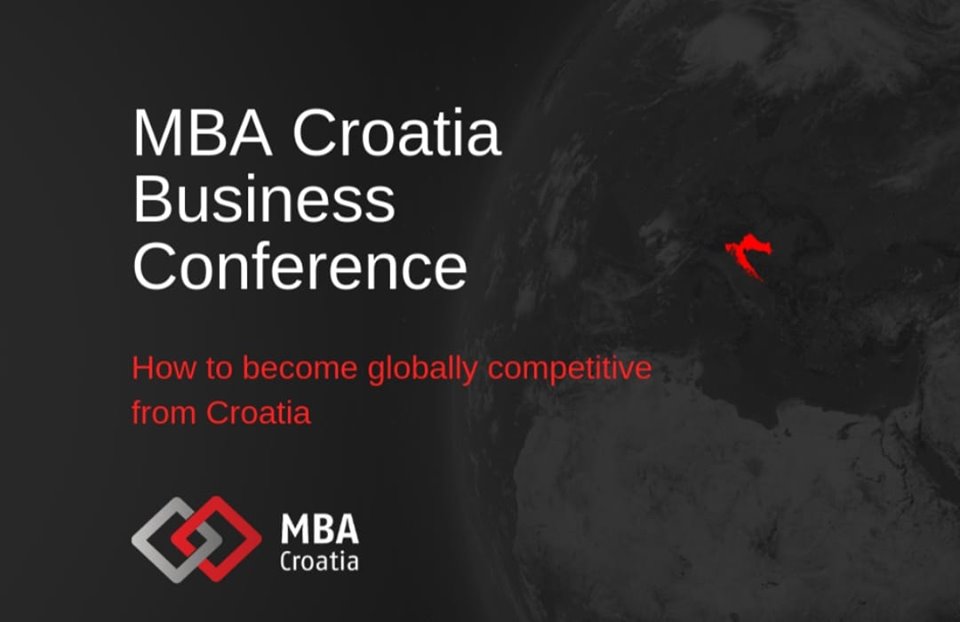
7. What do you hope the conference will achieve, and what are the next steps for MBA Croatia?
We hope to gather and share a lot of knowledge and experience with our members, and all other business people interested in that topic. One goal is to inspire some of them to start planning international expansion and help them in doing so.
Another goal is to prepare all of us, in the many areas that we will need to work in Croatia, in order to become a more business-friendly country.
Also, the conference is combined with our internal workshop – MBAonica, for members of the association only. That topic will be even more practical – How to open a company in other countries? We will have two lecturers and they will give some practical examples how to do it in Dubai, Switzerland and the UK.
You can learn more about MBA Croatia via the official website. You can connect with Aco Momcilovic via LinkedIn.
Looking to learn more about the entrepreneurs of Croatia? Check out the dedicated TCN Made in Croatia section.
MBA Croatia Conference: How to Become Globally Competitive from Croatia
May 26, 2019 - Can companies in Croatia become competitive on the global stage? A rich international gathering of international experts will explore the way forward at the MBA Croatia conference on this subject on June 6 in Zagreb.
One of the big differences in my life since moving from gorgeous Hvar to equally gorgeous Varazdin has been much closer contact with Croatia's entrepreneurial class, much (but by no means all) of which is based out of Zagreb.
After spending 13 years on a lovely Dalmatian island where everything is dominated by tourism, it has been very refreshing to meet so many stimulating and motivated individuals doing incredible things in the IT and other sectors.
And while the bigger and bleaker picture portrayed that much of Croatia's youth is emigrating in search of better economic opportunity. there is a determination to succeed right here in Croatia by the emerging entrepreneurial class which is increasingly attracting my interest.
One organisation which epitomises this is MBA Croatia, a group of academically trained professionals who are attending or completing their MBA studies. MBA Croatia will be celebrating 10 years of existence next month, and it will also be hosting what promises to be a useful and fascinating conference, on a sorely needed topic - How to become globally competitive from Croatia.
The event is introduced as follows by MBA Croatia:
MBA Croatia, as an association, has a mission to create a better and more prosperous society. MBA Croatia, as an association, has a mission to create a better and more prosperous society. Given this goal, this year we are organizing a conference called "How to become globally competitive from Croatia“. Our goal is through the first round table to inspire all of our companies with examples of successful companies to expand business to the international level. That is why we gather best practice and the experience of companies such as: Oradian, Doking, Enikon, Rasco...
As we gather world-class leaders, we consider it important not only to inspire, but to talk about the execution itself. Having this in mind, the another round table is formed where we want to comment best practices from countries like Latvia, Malta, Turkey, Slovenia. Moderators will be experienced economists and analysts, and we will also prepare a special guest for Key Note lecture.
For us it is important the recognition of our initiative and funding from companies like Vlahović Group, Bagatin Clinic, HEP, Coca Cola ...
Admission is free for members of the MBA Croatia Association, while the Early bird donation for non-members is 200kn and it can be purchased through this link:
https://www.entrio.hr/event/how-to-become-globally-competitive-from-croatia-6479
See you!
#mbacroatia
TCN will be at the event and reporting back. You can learn more about MBA Croatia from the official website.
Now meet some of the foreign entrepreneurs who are trying to make it in Croatia.



